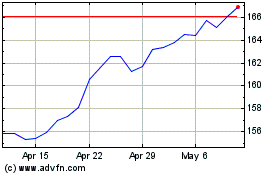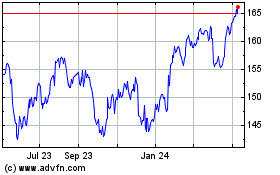Nestlé Drops Targets as Consumer Giants Struggle -- 2nd Update
February 16 2017 - 10:18AM
Dow Jones News
By Brian Blackstone
VEVEY, Switzerland--Nestlé SA has thrown out its long-running
annual sales-growth target--at least for the next three year---as
the world's largest packaged-food company struggles alongside the
rest of the industry against ultralow inflation and fast-changing
consumer tastes.
The world's consumer-goods giants, once mostly insulated from
uncertain economic times, have all scrambled recently to boost
sales to combat a host of global economic difficulties. Low sales
growth in recent years at Procter & Gamble Co. has forced it to
cut costs and slim down. Earlier this week, Trian Fund Management
LP, a big activist fund, said it had taken a stake in P&G,
heightening urgency to turn things around.
Unilever PLC last month reported weaker 2016 underlying sales,
which strip out currency moves and acquisitions. On Wednesday,
Kraft Heinz Co. said it plans more savings than initially targeted
in the face of sluggish revenue growth.
Each company is dealing with different challenges in an array of
markets and product categories. But all are being buffeted by
broadly similar difficulties that are largely out of their control:
tough competition in many of their biggest markets; currency swings
that have affected costs; difficulty raising prices amid low global
inflation; and fickle changes in what consumers want.
Among companies like Nestlé, focused more on packaged food,
consumers have clamored for healthier offerings. But those products
have proven harder than expected to translate into big sales
drivers.
Amid those industrywide issues, Nestlé Chief Executive Mark
Schneider said Thursday the Swiss-based owner of Nesquik flavored
drinks, Puppy Chow pet food and Stouffer's frozen meals would take
a "time out" trying to boost organic sales by 5% to 6% each year--a
target it fell far short from hitting again in 2016. Nestlé said
Thursday organic sales grew just 3.2% last year, down from 4.2% in
2015.
It was the fourth straight year it missed the target, and the
weakest since the company started tracking the metric in 1996.
Organic sales exclude currency fluctuations, acquisitions and
divestments.
Nestlé had in recent years emerged as a gold standard of sorts
for consumer products, largely because of how well it performed in
the aftermath of the global financial crisis. But its stock has
lagged behind its peers recently, falling nearly 3% in the last
year compared with a 7.4% rise in the Stoxx 600 European consumer
goods index.
Nestlé shares were down 1.5% in early afternoon trading in
Europe.
Mr. Schneider, who started as CEO on Jan. 1, said the company's
new aim was to achieve a more flexible "mid-single-digit organic
growth," as opposed to the long-specified 5%-6% target. But even
that softer goal won't kick in until 2020.
"This is a timeout from that model," Mr. Schneider said in an
interview. "For [2017], 18, 19 we don't wish to be measured against
that."
Mr. Scheider said the company needed "time to cope with some of
the remaining deflationary trends we're seeing, and we also need
the time to adapt to some of these very fundamental changes that
we've witnessed in the consumer-goods industry," he said.
Mr. Schneider said deal making wasn't a fix. Nestlé isn't on the
hunt for any major acquisitions in the near term, he said, citing
the "fairly lofty valuations" in the consumer-goods area. Rather,
Nestlé said it would deepen cost-cutting, which will "increase
restructuring costs considerably" to maintain profitability.
Nestlé has moved on several fronts to align its stable of
products with changing tastes. It has cut sugar and changed its
marketing strategy for Nesquik, and revamped its frozen foods
business, which includes Lean Cuisine, with new recipes.
The company has invested heavily in nutrition and health
sciences. But that division, which contributed 17% of overall sales
last year, is still small compared with mainstay businesses such as
beverages and prepared food.
Mr. Schneider's appointment as CEO underscores the urgency of
Nestlé's efforts to pivot. He joined from German health-care
company Fresenius SE. He is the first outsider to run the company
in nearly a century, and comes with a deep background in the sort
of health-care businesses Nestlé has said is its future.
"Generally, the share of these products over time is going to
increase," Mr. Schneider said.
Things are unlikely to improve much in 2017, however. Nestlé
said it expects organic growth between 2% and 4% this year.
Nestlé said Thursday that 2016 sales were 89.47 billion Swiss
francs ($89 billion), up slightly from 2015 but just below
analysts' expectations. Net profit was 8.5 billion francs, down
from 9.1 billion francs in 2015 and well below analysts'
expectations of around 9.5 billion francs. Last year's profit was
weakened by a roughly half-billion franc, noncash adjustment
related to local taxes.
Write to Brian Blackstone at brian.blackstone@wsj.com
(END) Dow Jones Newswires
February 16, 2017 10:03 ET (15:03 GMT)
Copyright (c) 2017 Dow Jones & Company, Inc.
Procter and Gamble (NYSE:PG)
Historical Stock Chart
From Mar 2024 to Apr 2024

Procter and Gamble (NYSE:PG)
Historical Stock Chart
From Apr 2023 to Apr 2024
